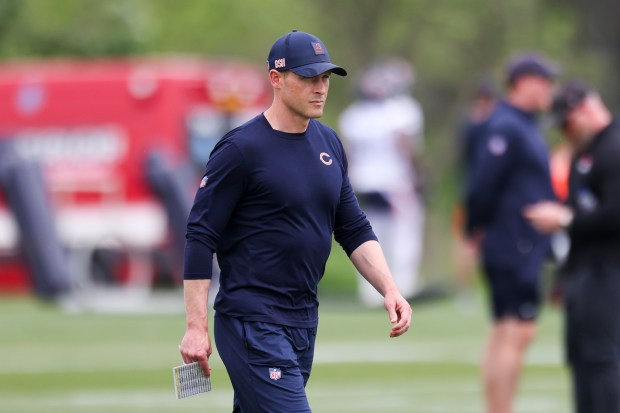John Schu takes over a room in the best kind of way.
His energy, his quick laugh, his warmth — all befitting a children’s book author and school librarian, which is what Schu does.
But I was in the room because of what Schu is. And he’s a survivor.
Schu has written a new book called “Louder Than Hunger,” a graphic novel intended for middle school readers and older. It shot straight to the New York Times bestsellers list the week it debuted, and Schu is on a tour of classrooms and bookstores to discuss it. On a recent Thursday evening, I was invited to moderate his discussion at The Book Stall in Winnetka.
“Louder Than Hunger” is about a 13-year-old boy named Jake who is living with anorexia nervosa and depression. He is hospitalized for treatment and, at one point, has to use a wheelchair because his shrinking body can no longer walk. Jake would like his body to take up less and less space until, ultimately, he and his body take up no space at all.
Jake is based on Schu. He was also a teenage boy who lived with anorexia nervosa and depression. He also had to use a wheelchair when his shrinking body could no longer walk. He wanted his disease to kill him.
Before he got sick, he was brutally bullied at school — ”verbal stones,” he calls the taunts and jeers.
“Stones that helped create the Voice,” Schu writes in “Louder Than Hunger.” “Stones that gave the Voice permission to speak.”
The Voice is a character in the book. It tells Jake not to eat. It tells him he’s not worthy of food. Or friendship. Or love. Or living. It drowns out all the other voices of people telling Jake the opposite. It’s that loud.
Being in a room with Schu now, three decades later, is a gift.
It’s a gift because of the way he tells stories and lights up at questions and bounds around a crowd giving away books and notepads and pieces of himself that show how he’s healed and show, importantly, that healing is possible. It’s a gift because it’s generous and unexpected.
I don’t think it’s giving away too much of the book to say that Jake’s grandmother is pivotal in his healing. If it’s the doctors and therapists and peers and procedures that inject life back into Jake, it’s his grandma who encourages him to embrace it.
“I ask you, no I beg you, to get yourself better and go out into this beautiful world and enjoy life,” she writes in a letter to Jake. “It’s your given right in this world to be healthy, and with health, comes happiness. Please give yourself permission to live your life to the fullest — you deserve it.”
Musicals are one of the things that bring Jake the most happiness. At one point, Jake’s mom is able to take Jake out of his treatment facility for the day and they go see a live performance of “Beauty and the Beast.”
“I absorb every note, every lyric, every colorful set, every costume change,” Schu writes, as Jake. “Like Belle, am I strange but special? Do I want much more than what this eating disorder gives me?”
Schu talks to students all day long, all week long, all year long. Sometimes more than 1,000 students a week, he estimates. At the Book Stall, I asked him what he would tell 13-year-old John Schu if he encountered him today.
He said he would tell him a story — based on real events — about growing up and getting to meet singer and actress Idina Menzel and pose for a photo together and even get her phone number, which he refuses to store in his phone for fear that he’ll accidentally dial Idina Menzel one day.
He showed us a slide of himself next to Menzel. He beamed. I beamed. I’m guessing the crowd beamed but the lights were lowered so the slide would show up and also I was afraid to look into the crowd because I knew I would cry and crying isn’t a great look for moderators.
I thought about something that I read in my pal John Duffy’s 2019 book, “Parenting the New Teen In the Age of Anxiety,” about the importance of injecting some awe and wonder in our kids’ lives. I looked it up a couple days later
“Because of all the stimuli they are exposed to, kids become discerning pragmatists at ever-earlier ages,” Duffy wrote. “They train themselves to peek behind the veil of anything they see, and put it to the sniff test of their reality. … Awe and wonder are the prices our children pay and, secondarily, that we pay ourselves.”
Counteract that, he says. Find moments and places that blow your kid’s mind. The ocean. A concert. A game, live, surrounded by fans in a stadium. Mountains.
“Please do not underestimate the importance of this,” Duffy wrote, “in their development as inspired, excited, life-filled adults.”
Life-filled adults is a pretty great goal for parenting, I think. It’s a pretty great goal for ourselves too.
I’m grateful for that guidance. And I’m grateful for Schu’s example of a life-filled adult in action — carrying around a very different set of verbal stones and using them to create a path toward happiness and healing and wonder. For any of us to follow.
Join the Heidi Stevens Balancing Act Facebook group, where she continues the conversation around her columns and hosts occasional live chats.
Twitter @heidistevens13



